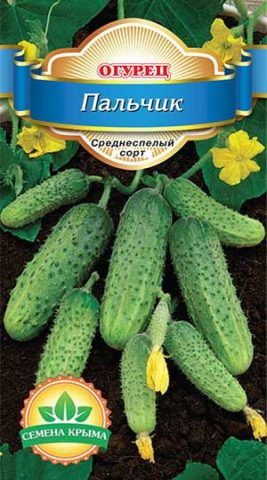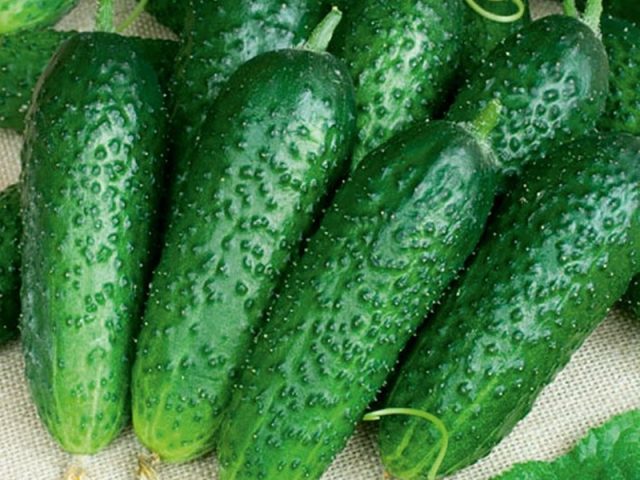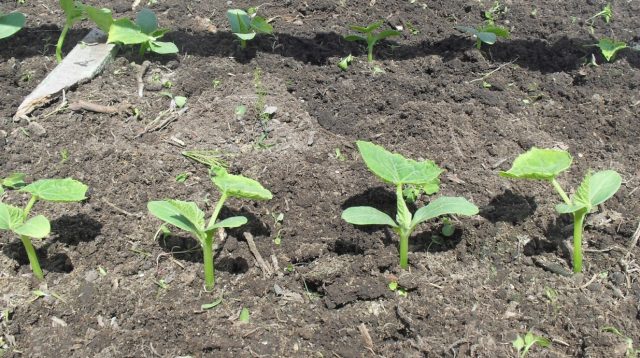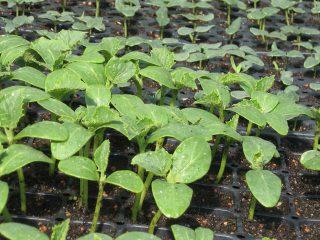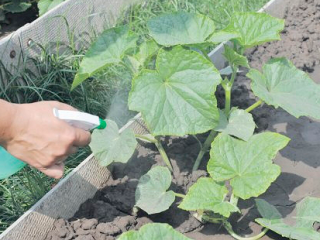Content
Cucumber Finger was bred in the Volgograd region at the experimental station VNIIR im. N.I. Vavilov by the Russian breeder Shefatov Vladimir Anatolyevich. This variety of cucumber is distinguished by early maturity, high immunity to various diseases, versatility in application and increased frost resistance. Description of cucumbers Finger, reviews and photos, growing rules, and nuances of agricultural technology are given in the material below.
Characteristics and description of the variety of cucumbers Finger
Finger cucumbers have been listed in the State Register of the Russian Federation since 2001. They are recommended for growing outdoors in the Central, Lower Volga and Central Black Earth regions.
Cucumber Finger belongs to indeterminate varieties, the bush is characterized by medium branching with a large number of lashes, the height of an adult plant sometimes reaches 2-2.5 m. Flowering is predominantly female, flowers require pollination by bees or other insects, ovaries are laid in bundles. The leaf plates are large, deep dark green in color, the lashes are strong and thick.
According to the author's description and reviews of gardeners, Finger cucumbers have a long fruiting period (about 2 months). The variety is early ripe - the first fruits can be removed 40-45 days after planting the seedlings in a permanent place.
Zelentsy cucumbers of the Finger variety have an elongated cylindrical shape. The skin is dark green with longitudinal stripes and mild spotting; on the entire surface of the cucumber there are rare but large tubercles, white pubescence. The average length of the greenery is 9.2-12.7 cm, with a diameter of 2.7-3.4 cm, weight - 114-120 g. The pulp of ripe cucumbers The finger has a dense structure, it is juicy and fragrant. When biting off or breaking, a pronounced crunch is heard.
Taste qualities of cucumbers
Finger cucumbers are distinguished by their excellent taste and excellent presentation. Zelentsy is consumed fresh, in salads and similar cold snacks, suitable for all types of home canning. When heat treated, they do not lose their characteristic crunch.
Pros and cons of the variety
The indisputable advantages of Finger cucumbers are the following:
- long fruiting period (up to 60 days);
- the predominance of female flowers;
- the formation of ovaries in the form of a bundle;
- a wide range of zoning;
- high taste and marketability;
- resistance to spring and autumn frosts;
- high immunity to many fungal diseases;
- downy mildew tolerance;
- high productivity;
- excellent transportability;
- versatility of use.
The disadvantages of the Finger variety can be considered the obligatory timely pinching, pollination by bees, the need to remove the greens in time, preventing them from overgrowing.
Optimal growing conditions
For growing cucumbers in the open field, you need to choose a place protected from direct sunlight during the period of increased solar activity.According to the latest studies, more intensive growth of zelents occurs at night.
The garden bed, where bee-pollinated cucumbers of the Finger variety will grow, should be located in a calm place, so that gusts do not blow away pollen attractive to insects. Cucumber bushes growing in a draft will be visited by bees much less often.
To prevent various diseases and obtain a rich harvest, every year it is necessary to follow the rules of crop rotation and not plant the same crop for several years in one place. Gradually "soil fatigue" occurs, there are fewer nutrients in it, and pathogens may be present that have overwintered with the remains of plants from the previous season.
For the successful cultivation of cucumbers of the Finger variety, the soil must be loose, airy, moderately moist. It is not recommended to place cucumber beds in places where groundwater accumulates, such a planting is fraught with rotting of the root system and the loss of the entire crop. In an environment that is too humid, many fungal diseases are likely to develop. Light sandy loam and loam are considered the most suitable for the cultivation of Finger cucumbers.
Cultivation of cucumbers Finger
The agricultural technology of the Finger variety is generally standard for cucumbers, but still, there are several nuances that should not be forgotten. The culture of this variety is grown on vertical trellises, providing direct access to pollinating insects.
Direct planting in open ground
When planting seeds directly into the ground, you need to focus on the average daily air temperature outside the window. It must be at least 15 ° C. In the middle lane, finger cucumbers are sown on the beds without prior germination in mid-May. Seeds soaked in a damp cloth for several days will sprout several days earlier than dry seeds.
Before sowing, the bed is cleaned of weeds, thoroughly loosened and fertilized with fresh manure. You can prepare the soil in the fall by digging up the ground and applying fertilizer at the rate of 1 m²:
- manure - 25 l;
- wood ash - 200 g;
- potassium - 25 g;
- superphosphate - 40 g.
Seeds are buried in the soil to a depth of 2 cm, with their nose up at an angle of 45 °. This arrangement will allow the sprout to quickly free itself from the seed coat and go up without bending in the soil, while the root system will form parallel to the ground and go deep down. The health and strength of the bush in the future, and, therefore, the harvest, will depend on how much effort the plant spends on germination. Before the first shoots appear, the cucumber bed is covered with foil or newspapers. According to vegetable growers, the seeds of Finger cucumbers sprout a week after sowing.
Seedling growing
The seedling growing method is good for greenhouses as it makes sense throughout the year. The seeds are placed in shallow furrows made in the nutrient soil and lightly covered from above. You can use a ready-made commercial substrate, but you can prepare it yourself by mixing the following ingredients:
- sod land - 4 parts;
- low peat - 4 parts;
- manure - 1 part;
- sawdust - 1 part.
Fertilizers are applied to 10 liters of soil:
- urea - 6 g;
- superphosphate - 14 g;
- potassium sulfate - 8 g;
- magnesium sulfate - 2 g.
Containers with crops are covered with polyethylene and placed in a room with a temperature of about 25 ° C. After the cotyledon leaves open, the temperature is gradually reduced by 5 ° C. For the active growth of cucumber seedlings, it is necessary to provide the plants with good illumination, a temperature of 20-23 ° C, regular watering and feeding.
When transferring seedlings to a permanent place, the plants should have a height of about 25 cm, 5 true leaves should have formed on the stem by that time. It is optimal to adhere to the scheme - 50 * 30 cm.
Watering and feeding
Finger cucumbers are watered regularly, but carefully. Excessive moisture can provoke root rot and the development of fungal infections.The bushes are watered at the root early in the morning or in the evening using settled warm water. Watering with cold water can cause a massive discharge of ovaries, the harvest in this case will be poor.
In the first 2 weeks after germination or planting seedlings in open ground, Finger cucumbers need to be fed with nitrogen fertilizer. This will allow the bush to build up the necessary green mass. During the flowering period, cucumbers are fertilized with phosphorus, during the active growing season - with nitrogen-potassium dressings.
Formation
Cucumbers of the Finger variety are quite tall, therefore, when grown in greenhouses or greenhouses, the main lash must be pinched over the trellis. The vertical growth on the trellis facilitates harvesting and spraying procedures if needed.
Protection against diseases and pests
The first rule of preventing the Finger cucumber variety from fungal diseases is to prevent waterlogging of the soil. To protect against pests (ticks, caterpillars, aphids, beetles), you can use both chemicals and folk remedies. In the case of the bee-pollinated variety Finger, it is better to do with the treatment of the bushes with a decoction of potato or tomato tops or with soapy water. To scare away slugs, wood ash is scattered under the cucumber.
Yield
6.8-7 kg of fresh and tasty Finger cucumbers can be removed from 1 m². In this case, the percentage of marketable zelents will be at the level of 76-95%.
Conclusion
Having carefully studied the description of Finger cucumbers, reviews and photos, an increasing number of vegetable growers decide to plant them on their site. Thanks to its excellent taste, attractive appearance, high immunity to various diseases, increased frost resistance, the cucumber Finger conquered Russian gardeners, it is becoming more and more in demand.
